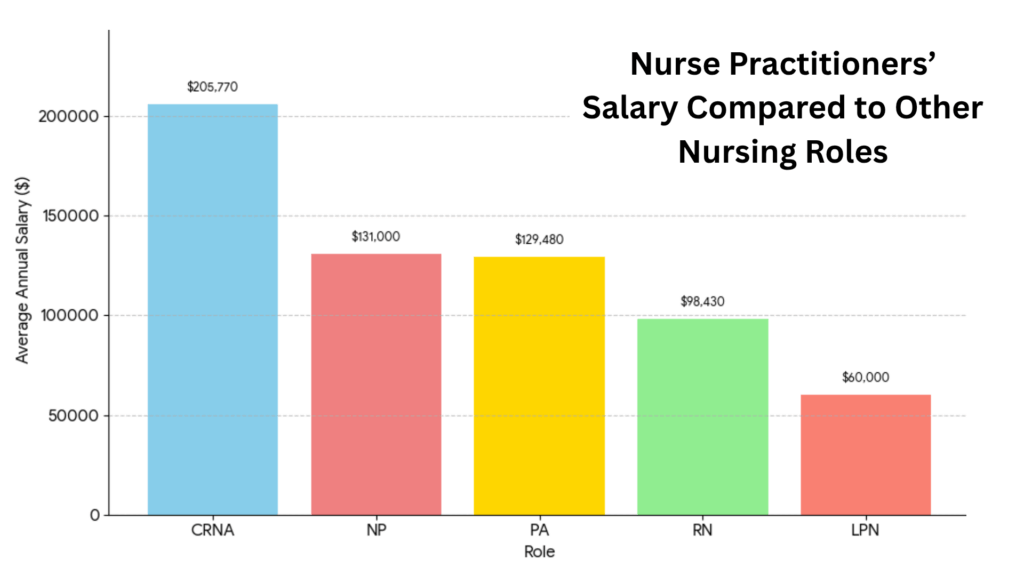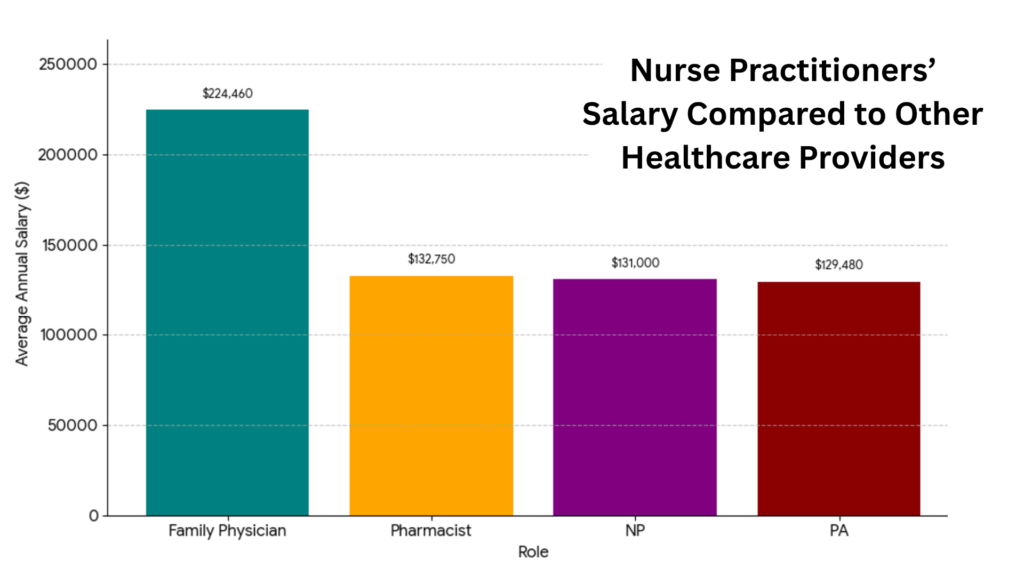Nurse practitioners bridge the gap between registered nurses and physicians in modern healthcare.
As advanced practice registered nurses, NPs provide comprehensive patient care, including diagnosis, treatment, and preventive services.
Understanding salary variations across regions and specialties is crucial for current and prospective NPs.
This analysis examines factors affecting NP salaries and compensation expectations across different states, specialties, and practice settings.
Average Nurse Practitioner Salary
The U.S. Bureau of Labor Statistics reports nurse practitioner salary averages between $127,160 and $132,000 per year nationally.
National Salary Overview:
- Average annual salary ranges from $127,160 to $132,000.
- Most professionals earn between $109,660 and $148,151.
- NPs rank among the highest-paid nursing professionals in healthcare.
Market Dynamics:
- Over 1.06 billion visits to NP offices occur annually.
- Nursing shortage and healthcare demands create a favorable job market.
- High demand translates to strong salary growth and job security.
How Does the Nurse Practitioners’ Salary Compare to Others?
Nurse practitioners (NPs) rank among the highest-paid nursing professionals, reflecting their advanced training and growing independence in patient care.
Nurse practitioners earn higher salaries than most other nursing roles, reflecting their advanced education and wider clinical authority.

When compared to other healthcare professionals, nurse practitioners earn close to physician assistants and pharmacists but less than physicians.

While physicians earn more overall, NPs offer one of the best income-to-education ratios in healthcare, balancing high salaries with shorter training and lower education costs.
Nurse Practitioner Salary by State
This section examines the highest and lowest paying states, regional disparities, and factors driving salary differences.
Southern states like Florida, Georgia, and Alabama pay much less than the West Coast and New England states.
Highest-Paying States for Nurse Practitioners
Western and Northeastern states dominate the highest salary rankings, with compensation often exceeding $140,000 annually.
Based on current Bureau of Labor Statistics data, examining nurse practitioner salary by state reveals that the states offering the highest compensation for nurse practitioners include:
| Rank | State | Average Annual Salary | Region | Cost of Living |
|---|---|---|---|---|
| 1 | California | $161,540 | West Coast | High |
| 2 | Nevada | $148,670 | West | Moderate-High |
| 3 | Washington | $145,400 | West Coast | High |
| 4 | New Jersey | $145,030 | Northeast | High |
| 5 | Oregon | $144,950 | West Coast | Moderate-High |
| 6 | Massachusetts | $137,000+ | Northeast | High |
| 7 | New York | $126,440 | Northeast | High |
| 8 | Connecticut | $133,000+ | Northeast | High |
| 9 | Alaska | $133,000+ | West | High |
| 10 | Wyoming | $118,810 | West | Moderate |
| 11 | Arizona | $117,480 | West | Moderate |
| 12 | Hawaii | $115,000+ | West | Very High |
| 13 | Minnesota | $114,000+ | Midwest | Moderate |
| 14 | Colorado | $113,000+ | West | Moderate-High |
| 15 | Rhode Island | $112,000+ | Northeast | Moderate-High |
Regional Salary Disparities
The variation in nurse practitioner salary reflects several economic and healthcare factors:
- Cost of Living: Higher salaries often correspond with increased living expenses
- Healthcare Demand: States with physician shortages typically offer higher NP compensation
- Economic Conditions: State budgets and healthcare funding allocation affect salary ranges
- Union Presence: Western and northeastern states have stronger nursing unions that boost NP salaries
Lowest-Paying States
While all states offer competitive NP salaries, some regions provide lower compensation that often correlates with reduced living costs.
The lowest earning states for nurse practitioners typically include Tennessee, Alabama, and other southeastern states, though these areas may offer other benefits, such as lower housing costs and different lifestyle advantages.
| State | Estimated Salary Range | Region | Cost of Living |
|---|---|---|---|
| Tennessee | $100,000 – $110,000 | Southeast | Low |
| Alabama | $95,000 – $105,000 | Southeast | Low |
| Florida | $105,000 – $115,000 | Southeast | Moderate |
| Georgia | $105,000 – $115,000 | Southeast | Moderate |
Key Factors Impacting Nurse Practitioner Salaries
Understanding the multiple variables that influence NP compensation helps professionals make informed career decisions and maximize their earning potential.
1. Experience and Specialization
Years of practice create significant salary differences.
According to PayScale, here’s how earnings typically progress over an NP’s career:
- Early Career (1-4 yrs): $104,000
- Mid Career (5-9 yrs): $109,000
- Late Career (10-19 yrs): $115,000
- Experienced (20+ yrs): $114,000.
Specialty choices dramatically affect compensation potential.
According to Payscale.com, psychiatric NPs have the highest average annual salary of $123,004 per year.
Other high-paying specializations include:
- Neonatal Nurse Practitioners
- Acute Care Nurse Practitioners
- Oncology Nurse Practitioners
- Pediatric Nurse Practitioners
2. Geographic Impact
Location affects salaries beyond simple state boundaries.
Metropolitan areas will have higher median wages than suburban or rural areas because of their high living costs.
Urban centers typically offer higher salaries but come with increased expenses, while rural areas may provide loan forgiveness programs and other incentives.
3. Healthcare Setting
Work environment significantly influences compensation packages.
Different workplace settings offer varying salary ranges, with residential intellectual and developmental disability, mental health, and substance abuse facilities paying around $163,000, while psychiatric and substance abuse hospitals offer approximately $144,860.
Practice settings that typically offer higher compensation include:
- Specialty hospitals
- Home healthcare services
- Private practice
- Emergency departments
Growth Trends in Nurse Practitioner Salaries
The outlook for NP compensation remains exceptionally positive, driven by several healthcare industry trends.
Projected Salary Growth
Per the U.S. Bureau of Labor Statistics, the employment of nurse practitioners is expected to grow by 46% over the next decade, which is much faster than the average for all other jobs.
That’s an additional 135,500 jobs created over the next 10 years.
This dramatic growth projection stems from multiple factors:
- Aging Population: Increased healthcare needs require more primary care providers
- PhysicianShortage: NPs help bridge the gap in healthcare access
- Healthcare Reform: Policy changes expand NP practice authority and utilization
Market Demand Impact
Several factors drive upward salary trends for nurse practitioners.
These include ongoing physician shortages, aging population needs, and legislative changes expanding NP practice authority.
Job market growth creates salary negotiation opportunities.
Career advancement is particularly strong in high-demand specialties and underserved areas.
Nurse Practitioner vs. Registered Nurse Salary
The educational investment required to become an NP produces substantial financial returns compared to registered nursing roles.
This comparison highlights key differences between the two career paths:
| Factor | Registered Nurse (RN) | Nurse Practitioner (NP) |
|---|---|---|
| Education Time | 2-4 years | ~6 years |
| Degree Required | ADN or BSN | MSN or DNP |
| Average Salary | $98,430 | $131,000+ |
| Salary Difference | – | +$33,570 more than RN |
| Practice Scope | Under physician supervision | Independent practice (varies by state) |
| Career Autonomy | Limited | High |
| Job Growth Outlook | Steady | 46% growth (much faster than average) |
| Specialization Options | Some | Extensive |
Maximizing Your Nurse Practitioner Salary
Strategic career planning can significantly enhance earning potential for both new and experienced NPs.
Key areas include advancing education, obtaining certifications, gaining specialized experience, choosing high-paying specialties, and selecting optimal geographic locations.
1. Professional Development Strategies
Several approaches can significantly increase NP earning potential:
- Pursue Advanced Education: DNP graduates can earn up to $168,030 in some states.
- Obtain Specialty Certifications: Additional credentials in high-demand areas increase marketability and compensation.
- Gain Clinical Experience: Building expertise in specific practice areas enhances salary negotiating power.
2. High-Paying Specialties
Several NP specialties consistently offer above-average compensation:
- Psychiatric-Mental Health: Growing demand for mental health services
- Acute Care: Hospital-based roles with complex patient populations
- Neonatal: Specialized care requiring advanced training
- Emergency Medicine: High-stress environment with premium compensation
3. Geographic Strategies
High NP demand creates negotiation opportunities; research local pay rates for leverage.
Consider these location strategies:
- Research Tax Implications: No-tax states like Texas and Florida increase take-home pay, while high-tax states such as California and New York reduce net income.
- Evaluate Cost of Living: High salaries may not equal better financial outcomes in expensive areas.
- Review Incentive Programs: Many states offer loan forgiveness, signing bonuses, or benefits for NPs in underserved areas.
Conclusion
Nurse practitioner salaries vary by location, specialization, experience, and practice setting. California and Nevada lead in compensation.
Healthcare demand growth and physician shortages create competitive NP compensation opportunities.
Strategic career planning maximizes earning potential.
Comprehending the factors that influence salary levels helps in making informed choices regarding education and practice location.
What’s your experience with nurse practitioner salaries?
Share your state, specialty, and salary range in the comments below.
Frequently Asked Questions
What Hourly Wage Do Nurse Practitioners Earn?
Most nurse practitioners earn between $53-$71 per hour, with the national average being approximately $61-$63 per hour, depending on location and experience level.
Can Nurse Practitioners Negotiate Their Starting Salary?
Yes, given the high demand for NPs, most candidates can successfully negotiate their base salary. Research local market rates, highlight specialized skills, and consider the total compensation package, including benefits.
Do Nurse Practitioners Receive Overtime Pay?
Most full-time employed NPs are classified as “exempt” employees and do not receive overtime pay. However, per diem and contract NPs often earn premium hourly rates that compensate for the lack of traditional benefits.










